特殊疑问句和一般疑问句的用法
一般疑问句和特殊疑问句完整版
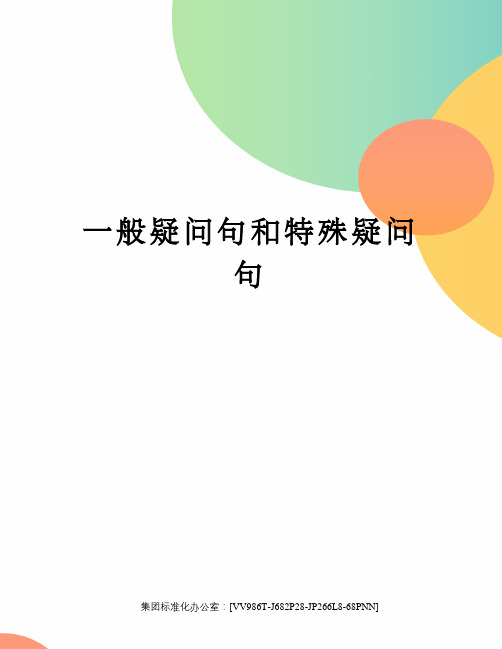
一般疑问句和特殊疑问句集团标准化办公室:[VV986T-J682P28-JP266L8-68PNN]一般疑问句与特殊疑问句Date:_______ name:_______一、【一般疑问句】1. 定义:用be、助动词或情态动词置于句首,并以“Yes,…”,或“No,…”或相当于yes / no回答的问句称为一般疑问句.2. 含系动词be的一般疑问句的构成:Be +主语+其它注意:am 只能跟在第一人称的单数 I 后面;are 搭配 you,不管you是单数还是复数;is 跟在第三人称单数 he, she, it后面Eg: I'm in Class 2, Grade 7.→ Are you in Class 2, Grade 7 (如遇第一人称,最好将其置换成第二人称)It's a map of China.→Is it a map of China这是一幅中国地图吗3. 含实义动词的一般疑问句的构成:Do/Does +主语 + 动词原形 + 其它注意:主语为第三人称单数,谓语动词为一般现在时单数第三人称形式"v-(e)s"时,用does,并要将谓语动词变回原形(如has→have,likes→like等);有时陈述句中的some还要变作any等。
如:Eg: She lives in Beijing. →Does she live in BeijingI like English. →Do you like EnglishThere are some books on my desk.→Are there any books on your desk4. 含情态动词的一般疑问句的构成:情态动词+主语+动词原形+其它Eg: I can spell it. →Can you spell it?I will do that for her. →Will you do that for her?She can drive. →Can she drive5. 一般疑问句的应答动词保持一致。
初一一般疑问句及特殊疑问句
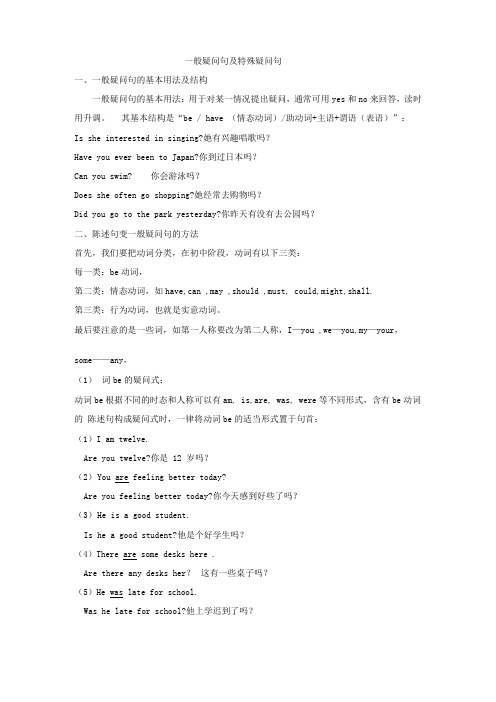
一般疑问句及特殊疑问句一、一般疑问句的基本用法及结构一般疑问句的基本用法:用于对某一情况提出疑问,通常可用yes和no来回答,读时用升调。
其基本结构是“be / have (情态动词)/助动词+主语+谓语(表语)”:Is she interested in singing?她有兴趣唱歌吗?Have you ever been to Japan?你到过日本吗?Can you swim? 你会游泳吗?Does she often go shopping?她经常去购物吗?Did you go to the park yesterday?你昨天有没有去公园吗?二、陈述句变一般疑问句的方法首先,我们要把动词分类,在初中阶段,动词有以下三类:每一类:be动词,第二类:情态动词,如have,can ,may ,should ,must, could,might,shall.第三类:行为动词,也就是实意动词。
最后要注意的是一些词,如第一人称要改为第二人称,I—you ,we—you,my—your,some——any,(1)词be的疑问式:动词be根据不同的时态和人称可以有am, is,are, was, were等不同形式,含有be动词的陈述句构成疑问式时,一律将动词be的适当形式置于句首:(1)I am twelve.Are you twelve?你是 12 岁吗?(2)Y ou are feeling better today?Are you feeling better today?你今天感到好些了吗?(3)H e is a good student.Is he a good student?他是个好学生吗?(4)There are some desks here .Are there any desks her?这有一些桌子吗?(5)He was late for school.Was he late for school?他上学迟到了吗?2.情态动词:如 can ,may ,should ,must, could,might,shall. (1)You can speak English.Can you speak English?你会说英语吗?(2)I must finish the work at once.Must I finish the work at once?我必须马上完成工作吗?(3)He should stay at home?Should he stay at home? 他必须呆在家吗?(5)She may be at home.May she be at home? 她可能在家吗?(6)He used to get up late.Used he to get up late?他通常起床很迟吗?3.实意动词的疑问式:含有一般实意动词的陈述句,通常应根据不同时态和人称在句首加助动词do, does, did等.一般现在时用do ,does,(第一人称,第二人称,所有的复数人称用do,第三人称单数用does), 一般过去时用did.(1)I go to school from Monday to Friday.Do you go to school from Monday to Friday? 你周一到周五都上学吗?(2) They come to school by bus.Do they come to school by bus ? 他们是坐公车上学吗?(3)The boy likes dancing.Does the boy like dancing? 这男孩喜欢唱歌吗?(4) Jim and Tom have dinner at 7o’ clock.Do Jim and Tom have dinner at 7o’ clock?吉姆和汤姆是 7 点吃晚餐吗? (5)She saw the film last night.Did she see the film last night? 她昨晚看了这部电影吗?(6)They did their homework just now.Did they do their homework just now? 他们刚刚做了家庭作业吗?陈述句变一般疑问句练习根据句后括号内的要求,填入句中所缺的词:1.I know the answer.(一般疑问句)know the answer?2.We can see some birds.L般疑问句)see birds?3.There is a computer in my house.(一般疑问句)a computer in house?4.There are some flowers on the teachers'desk.(一般疑问句)flowers on the teachers,desk?5.There are some apples on the 仃©6.(否定式)There apples on the tree.1.I think he is very 01d.(否定句)I think he very old.7.Please colour it 8100口.(否定句)colour it green.8.We can speak good English.变否定句)We speak good English.9.Thank you for helping me.(同义句) Thank you for.10.The re aren,t any pears in m©八乂(同义句)T here are pears in the box.11.Whose are these clothes?(同义句)are these?12.Let me look at your book.(同义句) ________________________________ Let me y our book.13.Her sweater is red.(对划线部分提问)is her sweater?14.My pencils are in the pencil-box.(对划线部分提问)your pencils?1.1I get up at six every day.(对划线部分提问)do you get up every day?16.There are fifty students in my class.(对划线部分提问) students are there in your class?17.These are cars.(用buses 改写成选择疑问句)A re these cars?18.The book is in my schoolbag.(变否定疑问句) the book in your school-bag?19.Two boys are in our house.(改为there be 句型)two boys in our house.20.Can't you find the 作葡定回答) ,I.陈述句变一般疑问句:1.His father is an English teacher.2.These cats are crying.3.They can swim.4.I like to read English.5.I go to school on foot.6.He likes English.7.His father goes to work by bus.8.He is crying under the tree.9.His birthday is on the twentieth of November.10.Mrs. Li and Kitty are in a big shop.11.Kitty is wearing her new uniform.12.The boy under the tree is hungry.13.He goes to school every day.15.I want to have a model car.16.She wants a cup of coffee.17.Mrs. Li and Kitty watch television at night.18.I do my homework after school.陈述句变一般疑问句练习21.Everybody is in the classroom.2.The boy does some housework at home.3.The children had a good time in the park.4.Jim has some story-books.5.Mr. Hunt told us something important at the meeting.6.The old man does morning exercises every morning.7.We are from China.8.I must finish my homework before eight o'clock.9.He often goes to the library on Sundays.10.They have a class meeting every week.特殊疑问句一、填入所缺的疑问词1.do you like summer? Because I can swim. cinema. 3.-------- can I get to Zhong Shan Park? By underground. 5.---------- b ag is on the desk?.Xiao Zhang,s. 7.will go with you? ChenJie. It’s 100 yuan. 二、选词填空 1. (What date,What day) is it today?2. (What date, what day) is today?3.4.5. ------------------6.7.8. ------------------9.. ____________ 10. . ____________ (How far , How long ) is your school?(How many , How much )orange juice can you buy? (Which , What ) fruit do you like? (Who , Whose ) is that boy? (Which , where) floor do you live?(How often , How long) do you go swimming ? (Howoften, How soon ) will you get to the forest? (How far, How fast) can he swim in one minute?三、.对划线部分提问1 .They bought a new bike yesterday. 3.The girl in red is my cousin.5.She made a living by selling newspapers. 7.There were 50_students in our class last term. 2. --------- i s the post office? It,s next to the4.are you? I,m 14 years old 6 book is Sarah's? The yellow one.8 is your skirt,Amy?It,s Monday. It,s May 27th It's ten minutes' walk. A little. Apples. He is Mike. The fifth floor. Three times a week.In one week. 600 metres.2. She is a nurse .4.He read the book for three hours.6. Julia often talks with me after class.8.They come from Hubei .四、选择题1. ( ) Excuse me is the nearest bookshop? Go down the street and turn left .A. howB. whatC. whereD. who2.()is a ticker for the film Hacker He? About forty yuan .A. How oldB. How manyC. How muchD. How often3.()—are you going? — I ,m going to the library.A. WhoB. WhichC. WhatD. Where4.()?----It ,s eight.A. What day is itB. What ,s five and threeC. How old are youD. What ,s your telephone number 5.() —?—I ,ve got a headache and a cough.A. What ,s the matter with youB. What ,s wrong with itC. Can I help youD. Howare you6. ( ) .-tea did you have? ——Two cups.A. How manyB. How muchC. How soonD. Which 7.() --a year does your school have sports meetings?--- Twice a year.A. How oftenB. How soonC. How longD. How many times9.Tim went to school late because he got up late. 11. Li Hui goes to school by light rail. 13. Let's meet at 7:30 tomorrow morning. 15. The book cost me nine dollars.17. Two plus four is six. factory.19.He is feeling well.10.It is windy .12. I wash it twice a week .14.The movie was wonderful.16 He will be back in four days .18. He often has lunch in the20. Dick hurt his leg last Sunday.8.( )--? ---- The one behind the tree.A. Whose girlB. Who,s that girlC. Which girlD. Where,s the girl9.( ) -are you going to be in the future? I want to be a person Yang Liwei.A. How , likeB. How , asC. What , likeD. What , as10.( ).will your father be back?.A How longB how oftenC How soonD How wide五、按要求改写句子(对划线部分提问)1.They meet each other once a month.they meet each other?2.Tony went swimming last Thursday.Tony swimming?3.My cousin looks like a sportsman. your cousin look?4.The short play was wonderful.did you the short play?did you the short play?5.Our party lasted three hours. did your party last?6.I watched the variety show on TV. did you watch on TV?1.1t's Tuesday. is it today?8.The supermarket is about five minutes' walk. is the supermarket?9.They went to the park by bus. they go to the park?10.Bob surfed the Internet for forty minutes yesterday morning.Bob surf the Internet yesterday morning?。
一般疑问句和特殊疑问句的用法
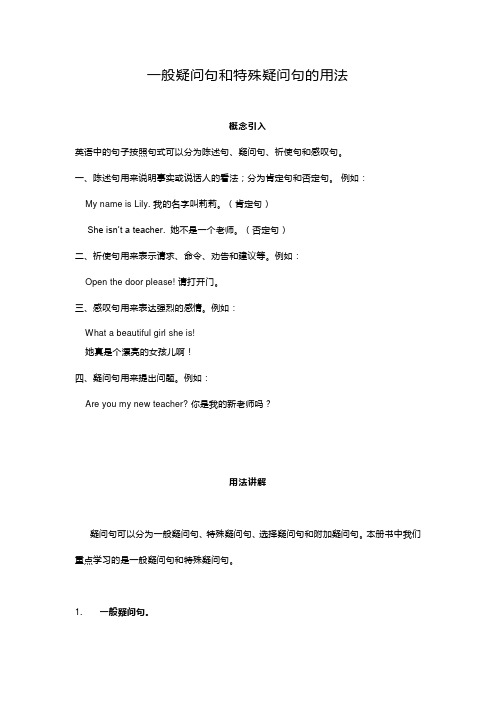
一般疑问句和特殊疑问句的用法概念引入英语中的句子按照句式可以分为陈述句、疑问句、祈使句和感叹句。
一、陈述句用来说明事实或说话人的看法;分为肯定句和否定句。
例如:My name is Lily. 我的名字叫莉莉。
(肯定句)She isn’t a teacher. 她不是一个老师。
(否定句)二、祈使句用来表示请求、命令、劝告和建议等。
例如:Open the door please! 请打开门。
三、感叹句用来表达强烈的感情。
例如:What a beautiful girl she is!她真是个漂亮的女孩儿啊!四、疑问句用来提出问题。
例如:Are you my new teacher? 你是我的新老师吗?用法讲解疑问句可以分为一般疑问句、特殊疑问句、选择疑问句和附加疑问句。
本册书中我们重点学习的是一般疑问句和特殊疑问句。
1. 一般疑问句。
(1)什么是一般疑问句?可以用Yes或者No来回答的疑问句是一般疑问句。
一般疑问句读的时候往往要用升调;译成汉语的时候常可以译为“……吗?”。
例如:-Are you a student? 你是个学生吗?-Yes, I am. 是的,我是。
-Can you speak English? 你会说英语吗?-Yes, I can. 是的,我会。
-Do you go to school every day? 你每天都上学吗?-No, I don’t. 不,不是。
(2)如何将陈述句变成一般疑问句?①句中有be动词(am,is,are,was,were等)、助动词(do,does,did,have,had等)或情态动词(can,must,will,may等)时,将其提到句首,句末加上问号即可。
例如:he is a clever girl. 她是个聪明的女孩。
→Is she a clever girl? 她是个聪明的女孩吗?I can swim. 我会游泳。
→Can you swim? 你会游泳吗?②如果句中没有be动词、助动词或情态动词,则要根据不同的时态在句首加上相应的助动词来构成一般疑问句。
疑问句用法
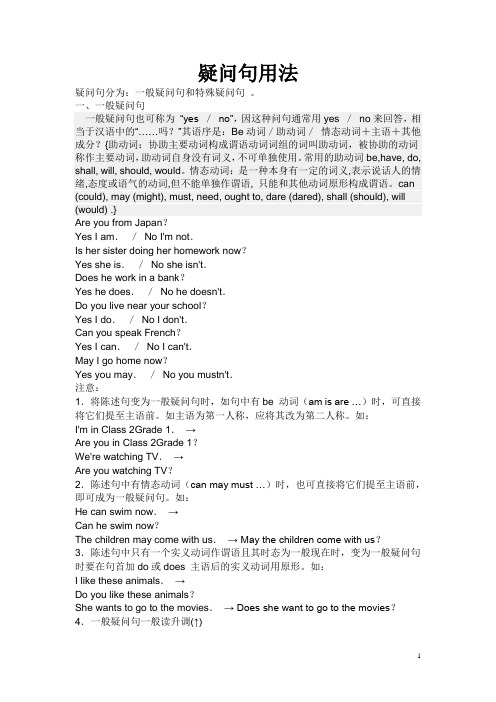
疑问句用法疑问句分为:一般疑问句和特殊疑问句。
一、一般疑问句一般疑问句也可称为“yes /no”,因这种问句通常用yes /no来回答,相当于汉语中的“……吗?”其语序是:Be动词/助动词/情态动词+主语+其他成分?{助动词:协助主要动词构成谓语动词词组的词叫助动词,被协助的动词称作主要动词,助动词自身没有词义,不可单独使用。
常用的助动词be,have, do, shall, will, should, would。
情态动词:是一种本身有一定的词义,表示说话人的情绪,态度或语气的动词,但不能单独作谓语, 只能和其他动词原形构成谓语。
can (could), may (might), must, need, ought to, dare (dared), shall (should), will (would) .}Are you from Japan?Yes I am./No I'm not.Is her sister doing her homework now?Yes she is./No she isn't.Does he work in a bank?Yes he does./No he doesn't.Do you live near your school?Yes I do./No I don't.Can you speak French?Yes I can./No I can't.May I go home now?Yes you may./No you mustn't.注意:1.将陈述句变为一般疑问句时,如句中有be 动词(am is are …)时,可直接将它们提至主语前。
如主语为第一人称,应将其改为第二人称。
如:I'm in Class 2Grade 1.→Are you in Class 2Grade 1?We're watching TV.→Are you watching TV?2.陈述句中有情态动词(can may must …)时,也可直接将它们提至主语前,即可成为一般疑问句。
一般疑问句与特殊疑问句
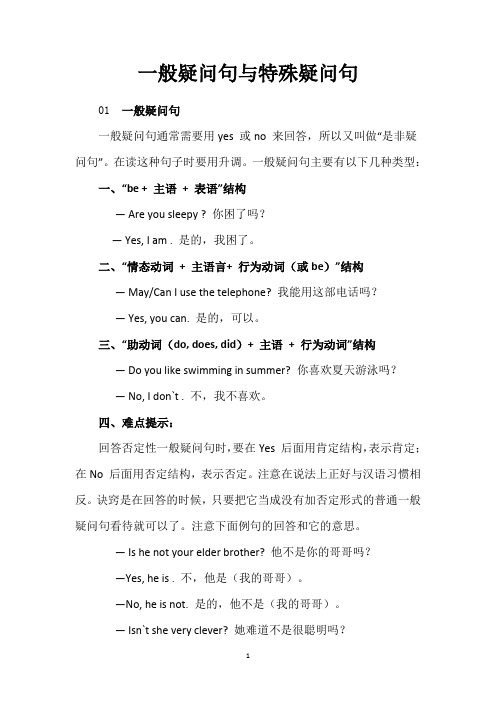
一般疑问句与特殊疑问句01一般疑问句一般疑问句通常需要用yes 或no 来回答,所以又叫做“是非疑问句”。
在读这种句子时要用升调。
一般疑问句主要有以下几种类型:一、“be + 主语+ 表语”结构— Are you sleepy ? 你困了吗?— Yes, I am . 是的,我困了。
二、“情态动词+ 主语言+ 行为动词(或be)”结构— May/Can I use the telephone? 我能用这部电话吗?— Yes, you can. 是的,可以。
三、“助动词(do, does, did)+ 主语+ 行为动词”结构— Do you like swimming in summer? 你喜欢夏天游泳吗?— No, I don`t . 不,我不喜欢。
四、难点提示:回答否定性一般疑问句时,要在Yes 后面用肯定结构,表示肯定;在No 后面用否定结构,表示否定。
注意在说法上正好与汉语习惯相反。
诀窍是在回答的时候,只要把它当成没有加否定形式的普通一般疑问句看待就可以了。
注意下面例句的回答和它的意思。
— Is he not your elder brother? 他不是你的哥哥吗?—Yes, he is . 不,他是(我的哥哥)。
—No, he is not. 是的,他不是(我的哥哥)。
— Isn`t she very clever? 她难道不是很聪明吗?— Yes, she is. 不,她很聪明。
— No, she is not . 是,她不聪明。
02特殊疑问句一、特殊疑问句是用来提出来特定问题的疑问句,要求听到问题的人针对特定情况来做具体的回答,不能像一般疑问句一样简单地用Yes 或No 来回答,特殊疑问句要用降调来读。
二、特殊疑问句的结构:特殊疑问词+ 一般疑问句Who do English homework in the evening?谁晚上做英语家庭作业?What do you do in the evening?你晚上做什么?What homework do you do in the evening?你晚上做什么家庭作业?When do you do English homework?你什么时候做英语家庭作业?三、注意:对人提问时wh o“谁”对所属(谁的)提问用whose“谁的”对哪一个提问用which“哪一个”对时间提问用when“什么时候”或what time“几点”对物体提问用what“什么”对地点提问用where“哪里”对原因提问用why“为什么”对方式提问用how“怎么样”对数量提问用how many“多少”(用于可数名词复数)或how much“多少”(用于不可数名词)四、难点提示1、以why开头的特殊疑问句否定形式常用于表示建议、请求等。
一般疑问句,特殊疑问句,选择疑问句,反义疑问句的详细用法
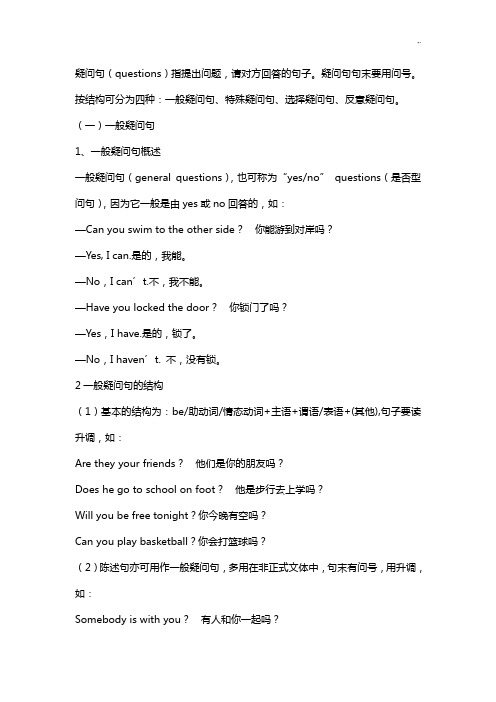
疑问句(questions)指提出问题,请对方回答的句子。
疑问句句末要用问号。
按结构可分为四种:一般疑问句、特殊疑问句、选择疑问句、反意疑问句。
(一)一般疑问句1、一般疑问句概述一般疑问句(general questions),也可称为“yes/no”questions(是否型问句),因为它一般是由yes或no回答的,如:—Can you swim to the other side?你能游到对岸吗?—Yes, I can.是的,我能。
—No,I can’t.不,我不能。
—Have you locked the door?你锁门了吗?—Yes,I have.是的,锁了。
—No,I haven’t. 不,没有锁。
2一般疑问句的结构(1)基本的结构为:be/助动词/情态动词+主语+谓语/表语+(其他),句子要读升调,如:Are they your friends?他们是你的朋友吗?Does he go to school on foot?他是步行去上学吗?Will you be free tonight?你今晚有空吗?Can you play basketball?你会打篮球吗?(2)陈述句亦可用作一般疑问句,多用在非正式文体中,句末有问号,用升调,如:Somebody is with you?有人和你一起吗?He didn’t finish the work?他没有做完活吗?You are fresh from America,I suppose?我猜,你刚从美国回来吧?3、一般疑问句的答语(1)一般疑问句一般由yes或no来回答,如:—Are you tired?你累了吗?—Yes,I am.是的,累了。
—No, I’m not.不,不累。
—Does she do the cleaning?她扫除了吗?—Yes ,she does.是的,她打扫了。
—No,she doesn’t.不,她没打扫。
(2)回答一般疑问句除了用yes或no外,也可用certainly,probably,perhaps,of course,all right,with pleasure等代替yes,用never,not at all等代替no,如:—Can you help me?你能帮个忙吗?—Certainly.当然。
一般疑问句和特殊疑问句宾语从句
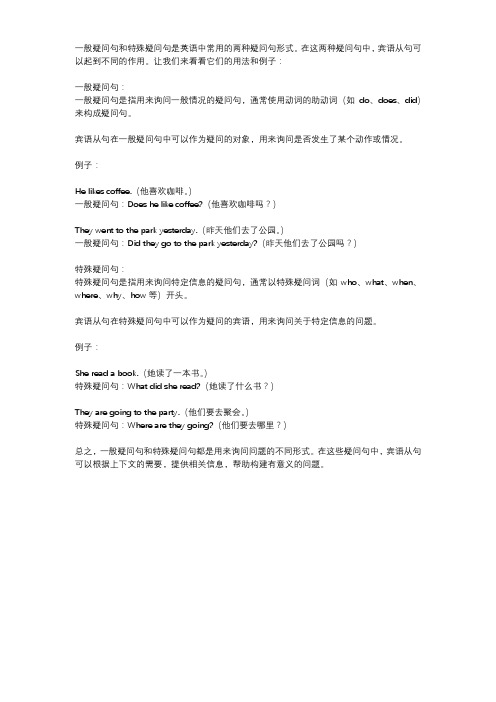
一般疑问句和特殊疑问句是英语中常用的两种疑问句形式。
在这两种疑问句中,宾语从句可以起到不同的作用。
让我们来看看它们的用法和例子:
一般疑问句:
一般疑问句是指用来询问一般情况的疑问句,通常使用动词的助动词(如do、does、did)来构成疑问句。
宾语从句在一般疑问句中可以作为疑问的对象,用来询问是否发生了某个动作或情况。
例子:
He likes coffee.(他喜欢咖啡。
)
一般疑问句:Does he like coffee?(他喜欢咖啡吗?)
They went to the park yesterday.(昨天他们去了公园。
)
一般疑问句:Did they go to the park yesterday?(昨天他们去了公园吗?)
特殊疑问句:
特殊疑问句是指用来询问特定信息的疑问句,通常以特殊疑问词(如who、what、when、where、why、how等)开头。
宾语从句在特殊疑问句中可以作为疑问的宾语,用来询问关于特定信息的问题。
例子:
She read a book.(她读了一本书。
)
特殊疑问句:What did she read?(她读了什么书?)
They are going to the party.(他们要去聚会。
)
特殊疑问句:Where are they going?(他们要去哪里?)
总之,一般疑问句和特殊疑问句都是用来询问问题的不同形式。
在这些疑问句中,宾语从句可以根据上下文的需要,提供相关信息,帮助构建有意义的问题。
初一一般疑问句及特殊疑问句

一般疑问句及特殊疑问句一、一般疑问句的基本用法及结构一般疑问句的基本用法:用于对某一情况提出疑问,通常可用yes和no来回答,读时用升调。
其基本结构是“be / have (情态动词)/ 助动词+主语+谓语(表语)”:Is she interested in singing? 她有兴趣唱歌吗?Have you ever been to Japan? 你到过日本吗?Can you swim? 你会游泳吗?Does she often go shopping? 她经常去购物吗?Did you go to the park yesterday? 你昨天有没有去公园吗?二、陈述句变一般疑问句的方法首先,我们要把动词分类,在初中阶段,动词有以下三类:每一类:be动词,第二类:情态动词,如have ,can ,may ,should ,must, could,might,shall.第三类:行为动词,也就是实意动词。
最后要注意的是一些词,如第一人称要改为第二人称,I—you ,we—you,my—your,some—any,1.动词be的疑问式:动词be根据不同的时态和人称可以有am, is,are, was, were等不同形式,含有be动词的陈述句构成疑问式时,一律将动词be的适当形式置于句首:(1)I am twelve.Are you twelve? 你是12岁吗?(2)You are feeling better today?Are you feeling better today? 你今天感到好些了吗?(3)He is a good student.Is he a good student? 他是个好学生吗?(4)There are some desks here .Are there any desks her?这有一些桌子吗?(5)He was late for school.Was he late for school? 他上学迟到了吗?2.情态动词:如can ,may ,should ,must, could,might,shall.(1)You can speak English.Can you speak English? 你会说英语吗?(2)I must finish the work at once.Must I finish the work at once? 我必须马上完成工作吗?(3)He should stay at home?Should he stay at home? 他必须呆在家吗?(5)She may be at home.May she be at home? 她可能在家吗?(6)He used to get up late.Used he to get up late? 他通常起床很迟吗?3.实意动词的疑问式:含有一般实意动词的陈述句,通常应根据不同时态和人称在句首加助动词do, does, did等.一般现在时用do ,does, (第一人称,第二人称,所有的复数人称用do,第三人称单数用does), 一般过去时用did.(1)I go to school from Monday to Friday.Do you go to school from Monday to Friday? 你周一到周五都上学吗?(2)They come to school by bus.Do they come to school by bus ? 他们是坐公车上学吗?(3)The boy likes dancing.Does the boy like dancing? 这男孩喜欢唱歌吗?(4)Jim and Tom have dinner at 7o’clock.Do Jim and Tom have dinner at 7o’clock? 吉姆和汤姆是7点吃晚餐吗?(5)She saw the film last night.Did she see the film last night? 她昨晚看了这部电影吗?(6)They did their homework just now.Did they do their homework just now? 他们刚刚做了家庭作业吗?特殊疑问词陈述句变一般疑问句练习根据句后括号内的要求,填入句中所缺的词:1.I know the answer.(一般疑问句)______ ______ know the answer?2.We can see some birds.(一般疑问句)______ ______ see ______ birds?3.There is a computer in my house.(一般疑问句)______ ______ a computer in house?4.There are some flowers on the teachers’desk.(一般疑问句)______ ______ ______ flowers on the teachers’desk?5.There are some apples on the tree.(否定式)There ______ ______ ______ apples on the tree.6.I think he is very old.(否定句) I ______ think he ______ very old.7.Please colour it green.(否定句) ______ ______ colour it green.8.We can speak good English.(变否定句) We ______ ______ speak good English.9.Thank you for helping me.(同义句) Thank you for ______ ______ .10.There aren’t any pears in thebox.(同义句) There are ______ pears in the box.11.Whose are these clothes?(同义句) ______ ______ are these?12.Let me look at your book.(同义句) Let me ______ ______ ______ ______ your book.13.Her sweater is red.(对划线部分提问) ______ ______ is her sweater?14.My pencils are in the pencil-box.(对划线部分提问) ______ ______ your pencils?15.I get up at six every day.(对划线部分提问) ______ ______ do you get up every day?16.There are fifty students in my class.(对划线部分提问)______ ______ students are there in your class?17.These are cars.(用buses改写成选择疑问句) Are these cars______ ______ ?18.The book is in my schoolbag.(变否定疑问句) ______ the book in your school-bag?19.Two boys are in our house.(改为there be句型) ______ ______ two boys in our house.20.Can’t you find the map?(作肯定回答) ______ ,I______ .陈述句变一般疑问句:1. His father is an English teacher.2. These cats are crying.3. They can swim.4. I like to read English.5. I go to school on foot.6. He likes English.7. His father goes to work by bus.8. He is crying under the tree.9. His birthday is on the twentieth of November.10. Mrs. Li and Kitty are in a big shop.11. Kitty is wearing her new uniform.12. The boy under the tree is hungry.13. He goes to school every day.15. I want to have a model car.16. She wants a cup of coffee.17. Mrs. Li and Kitty watch television at night.18. I do my homework after school.陈述句变一般疑问句练习21. Everybody is in the classroom.2. The boy does some housework at home.3. The children had a good time in the park.4. Jim has some story-books.5. Mr. Hunt told us something important at the meeting.6. The old man does morning exercises every morning.7. We are from China.8. I must finish my homework before eight o’clock.9. He often goes to the library on Sundays.10. They have a class meeting every week.特殊疑问句一、填入所缺的疑问词1._______do you like summer? Because I can swim.2. is the post office? It’s next to the cinema.3.can I get to Zhong Shan Park? By underground.4.______ _______ are you? I’m 14 years old5.bag is on the desk?.Xiao Zhang’s.6. book is Sarah’s? The yellow one.7. ______ will go with you? ChenJie. 8. _______is your skirt,Amy? It’s 100 yuan.二、选词填空1.(What date,What day) is it today? It’s Monday.2.(What date, what day) is today? It’s May 27th.3.(How far , How long ) is your school? It's ten minutes' walk.4.(How many , How much )orange juice can you buy? A little.5.(Which , What ) fruit do you like? Apples.6.(Who , Whose ) is that boy? He is Mike.7.(Which , where) floor do you live? The fifth floor.8.(How often , How long) do you go swimming ? Three times a week.9..____________ (How often, How soon ) will you get to the forest? In one week.10..____________(How far, How fast) can he swim in one minute? 600 metres.三、.对划线部分提问1.They bought a new bike yesterday.2. She is a nurse ._________________________________ ______________________________ 3.The girl in red is my cousin. 4.He read the book for three hours. _________________________________ _______________________________ 5.She made a living by selling newspapers. 6. Julia often talks with me after class. ________________________________ ________________________________ 7.There were 50 students in our class last term. 8.They come from Hubei ._________________________________ _________________________________ 9.Tim went to school late because he got up late. 10.It is windy ._______________________________________________________________________11. Li Hui goes to school by light rail. 12. I wash it twice a week ._____________________________________________________________________13. Let's meet at 7:30 tomorrow morning. 14.The movie was wonderful.___________________________________________________________________15. The book cost me nine dollars. . 16 He will be back in four days .____________________________________________________________________17.Two plus four is six. 18. He often has lunch in the factory._______________________________________________________________________19.He is feeling well. 20. Dick hurt his leg last Sunday. _______________________________________________________________________四、选择题1.( ) Excuse me ______ is the nearest bookshop? Go down the street and turn left .A. howB. whatC. whereD. who2.( ) ______ is a ticker for the film Hacker He? About forty yuan .A. How oldB. How manyC. How muchD. How often3.( )—________ are you going? —I’m going to the library.A. WhoB. WhichC. WhatD. Where4.( ) _______________? ----It’s eight.A. What day is itB. What’s five and threeC. How old are youD. What’s your telephone number5.( ) —____________? —I’ve got a headache and a cough.A. What’s the matter with youB. What’s wrong with itC. Can I help youD. How are you6.( ) .-______ tea did you have? ----Two cups.A. How manyB. How muchC. How soonD. Which7.( ) --______ a year does your school have sports meetings? --- Twice a year.A. How oftenB. How soonC. How longD. How many times8.( )-- ______? -----The one behind the tree.A. Whose girlB. Who’s that girlC. Which girlD. Where’s the girl9.( ) -______ are you going to be in the future? I want to be a person _____ Yang Liwei.A. How , likeB. How , asC. What , likeD. What , as10.( ).______ will your father be back? .A How longB how oftenC How soonD How wide五、按要求改写句子(对划线部分提问)1.They meet each other once a month.________ ________ ________ they meet each other?2.Tony went swimming last Thursday.________ ________ Tony _______ swimming?3.My cousin looks like a sportsman. ________ ________ your cousin look?4.The short play was wonderful.________ did you ______ the short play?________ did you _______ ______ the short play?5.Our party lasted three hours. _______ _______ did your party last?6.I watched the variety show on TV. ________ ________ did you watch on TV?7.It's Tuesday. ________ ________ is it today?8.The supermarket is about five minutes' walk. ________ ________ is the supermarket?9.They went to the park by bus. ________ ________ they go to the park?10.Bob surfed the Internet for forty minutes yesterday morning._______ _______ ________ Bob surf the Internet yesterday morning?。
一般疑问句、特殊疑问句的构成形式和基本用法
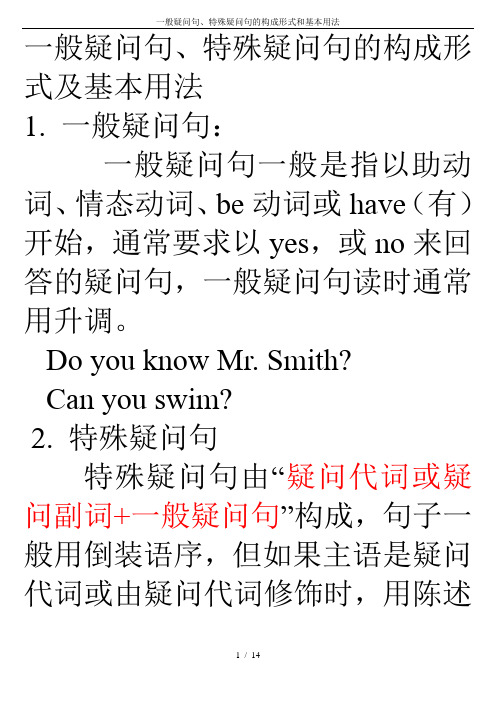
一般疑问句、特殊疑问句的构成形式及基本用法1. 一般疑问句:一般疑问句一般是指以助动词、情态动词、be动词或have(有)开始,通常要求以yes,或no来回答的疑问句,一般疑问句读时通常用升调。
Do you know Mr. Smith?Can you swim?2. 特殊疑问句特殊疑问句由“疑问代词或疑问副词+一般疑问句”构成,句子一般用倒装语序,但如果主语是疑问代词或由疑问代词修饰时,用陈述句的语序。
特殊疑问句不能用yes 或no回答,读时用降调。
例如:Who is on duty today?How long have you been in Beijing? What time do you get up every morning?What must I do now?3. 注意疑问词的选择1. 问“谁”用who或whom。
如:Who is a doctor?Li Lei is a doctor.(对主语提问用who,对宾语提问用who,whom均可)2. 问“谁的”用whose。
如:Whose book is this?This is his book.3. 问“地点”用where。
如:Where is the ball?The ball is under the bed.4. 问“原因”用why。
如:Why didn't he come?He didn't come because he was ill.5. 问“身体状况”用how。
如:How are you?I'm fine.6. 问“方式”用how。
如:How did he do it?He did it in that way.7. 问“程度”用“how +被修饰语”。
如:How wide is the river?The river is five metres wide.8. 问“多少”用how much或how many。
初中英语一般疑问句和特殊疑问句
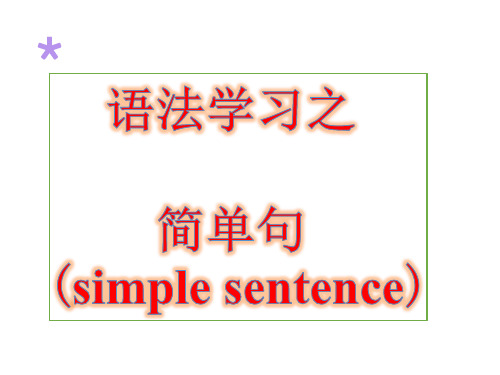
Is your father angry? (一般现在时) Yes, he is. No, he isn’t.
Were the babies crying last night?(过去进行时) Yes, they were. No, they weren’t.
PART 01
考点一:一般疑问句
一、定义
不用疑问词,但需要用yes或no回答的疑问句,叫 一般疑问句,且句末用问号“?”。
二、一般疑问句的基本用法及结构
1. 一般疑问句用于对某一情况提出疑问,通常可用 yes和no来回答,读时用升调。
一般疑问句主要有三种结构: ①Be+主语+其他? ②助动词+主语+谓语动词+其他? ③情态动词+主语+动词原形+其他?
句型:Do(Does, Did)+主语+动词原形+ 其他?
Did he do morning exercises yesterday? Yes, he did. No, he didn’t.
Do you go to school every day? Does the boy like dancing? Did you see the film last nபைடு நூலகம்ght?
Does he have [Has he] anything to say? Do you have [Have you] to leave so soon? Did you have [Had you] any friends then?
②用作实意动词表示动作,如表示“吃(=eat)”、 “喝(=drink)”、“拿(=take)”、“收到 (=receive)”、“度过(=spend)”等,构成疑问 式时不能将have提前至句首,而应在句首使用do, does, did:
一般疑问句和特殊疑问句的用法、结构、回答详细总结归纳

一般疑问句和特殊疑问句的结构、用法、回答详细总结讲解唐赳学英语,必须弄懂英语最基本的两种疑问句,即:一般疑问句和特殊疑问句。
一、一般疑问句一般疑问句是疑问句的一种。
它是指用yes(是)或no(不是)来回答的句子。
翻译成汉语,凡是句末都带有“吗?”的疑问句都是一般疑问句。
1、一般疑问句的总体基本结构:其结构是:系动词be / 助动词/情态动词+主语+其他成分+?如:Are you a student? 你是学生吗?2、一般疑问句的回答方式:肯定回答:Yes,主语+提问的be/助动词/情态动词.如上句:Are you a student? 你是学生吗?肯定回答就是:Yes, I am. 是的,我是。
否定回答:No,主语+提问的be / 助动词/ 情态动词的否定形式(not).如上句:Are you a student? 你是学生吗?否定回答就是:No, I am not.3、英语中的一般疑问句分为两种主要的形式:第一大类:为含有be动词(is am are,was, were)或情态动词的一般疑问句,其结构为:be+主语+其它部分+?情态动词+主语+动词原形+其它部分+?肯定回答用“Yes,主语+be \ 情态动词.”,否定回答用“No,主语+be \ 情态动词+not.”。
be或情态动词和not可用缩写形式,主要有isn’t,aren’t,wasn’t,weren’t,can’t,mustn’t,needn’t等。
例1:Is this your English book?这是你的英语书吗?肯定回答:Yes,it is. 是的,它是(我的)。
否定回答:No,it isn`t. 不,它不是(我的)。
例2:Are these your English books?这些是你的英语书吗?肯定回答:Yes,they are. 是的,它们是。
否定回答:No,they aren’t.不,它们不是。
例3: Can you speak English? 你能讲英语吗?(本句式含有情态动词can 的一般疑问句)肯定回答:Yes,I can. 是的,我能。
特殊疑问句和一般疑问句的结构

特殊疑问句和一般疑问句的结构特殊疑问句和一般疑问句是语法中常用的两种问句形式。
它们在句子结构和用法上有着明显的区别。
在本文中,我们将探讨特殊疑问句和一般疑问句的结构以及它们的用法。
首先,让我们来看一下特殊疑问句的结构。
特殊疑问句用于询问特定的信息或事实,通常以疑问词开头。
常见的疑问词包括:什么(what)、谁(who)、哪里(where)、为什么(why)、何时(when)、如何(how)等。
特殊疑问句的结构一般为:疑问词+助动词/系动词+主语+其他成分。
例如:1.你在做什么?(What are you doing?)2.他是谁?(Who is he?)3.你在哪里学习?(Where do you study?)4.为什么你这么晚才回来?(Why did you come back so late?)5.你是怎样学会弹吉他的?(How did you learn to play the guitar?)特殊疑问句的结构较为固定,疑问词通常位于句首,然后是助动词或系动词,接着是主语和其他成分。
需要注意的是,特殊疑问句的回答通常是具体的信息或事实。
接下来,让我们来看一下一般疑问句的结构。
一般疑问句用于对陈述句进行疑问,询问是否属实。
一般疑问句的结构为:助动词/系动词+主语+其他成分?如果句子中没有助动词或系动词,那么需要在句首加上适当的助动词(如do、does、did)来构成疑问句。
例如:1.你喜欢音乐吗?(Do you like music?)2.他是你的朋友吗?(Is he your friend?)3.你已经完成作业了吗?(Have you finished your homework?)4.他昨天去过那家餐厅吗?(Did he go to that restaurant yesterday?)一般疑问句的结构比较简单,主要是通过改变陈述句的语序来构成疑问句。
需要注意的是,一般疑问句通常可以用“是”或“否”来回答。
一般疑问句、特殊疑问句、选择疑问句、反义疑问句的详细用法

(一)一般疑问句1、一般疑问句概述一般疑问句(general questions),也可称为“yes/no” questions(是否型问句),因为它一般是由yes或no回答的,如:—Can you swim to the other side?你能游到对岸吗?—Yes, I can.是的,我能。
—No,I can’t.不,我不能。
—Have you locked the door?你锁门了吗?—Yes,I have.是的,锁了。
—No,I haven’t. 不,没有锁。
2一般疑问句的结构(1)基本的结构为:be/助动词/情态动词+主语+谓语/表语+(其他),句子要读升调,如:Are they your friends?他们是你的朋友吗?Does he go to school on foot?他是步行去上学吗?Will you be free tonight?你今晚有空吗?Can you play basketball?你会打篮球吗?(2)陈述句亦可用作一般疑问句,多用在非正式文体中,句末有问号,用升调,如:Somebody is with you?有人和你一起吗?He didn’t finish the work?他没有做完活吗?You are fresh from America,I suppose?我猜,你刚从美国回来吧?3、一般疑问句的答语(1)一般疑问句一般由yes或no来回答,如:—Are you tired?你累了吗?—Yes,I am.是的,累了。
—No, I’m not.不,不累。
—Does she do the cleaning?她扫除了吗?—Yes ,she does.是的,她打扫了。
—No,she doesn’t.不,她没打扫。
(2)回答一般疑问句除了用yes或no外,也可用certainly,probably,perhaps,of course,all right,with pleasure等代替yes,用never,not at all等代替no,如:—Can you help me?你能帮个忙吗?—Certainly.当然。
特殊疑问句和一般疑问句的用法

(一)由be(am,is,are)引导的一般疑问句1、Am I a student? 我是学生吗?Yes,you are./ No,you aren ' t.2、Is this /that/it a chair? 这/ 那/ 它/ 是一把椅子吗?Yes,it is. /No,itisn ' t.3、Is she/Amy your sister?她/ 艾米是你的妹妹吗?Yes,she is ./ No,she isn 't.4、Is he/Mike your brother? 他/ 迈克是你的哥哥吗?Yes,he is./No,he isn 't.5、Is your brother helpful at home? 你哥哥在家有用吗?Yes, he is ./ No, he isn ' t.6 Is there a forest in the park? 在公园有一个森林吗?Yes,there is./No,there isn ' t.是的,有。
/不,没有。
7、Are there any panda s in the mountains? 在山上有熊猫吗?Yes,there are./No,there aren ' t.是的,有。
/不,没有。
8、Are they dusk s?它们是鸭子吗?(问物)Yes, they are. /No,they aren ' t.是的,它们是。
/不,它们不是。
9、Are they famers? 他们是农民吗?(问人)Yes, they are. /No,they aren ' t.是的,他们是。
/ 不,他们不是。
10、Are you a teacher? 你是一个老师吗?(问you用I回答)Yes, I am./No,I ' m not.是的,我是。
/不,我不是。
11、Are you teacher s?你们是老师吗?</P< p>Yes,we are./No,we aren ' t.是的,我们是。
一般疑问句和特殊疑问句的区别及用法概要
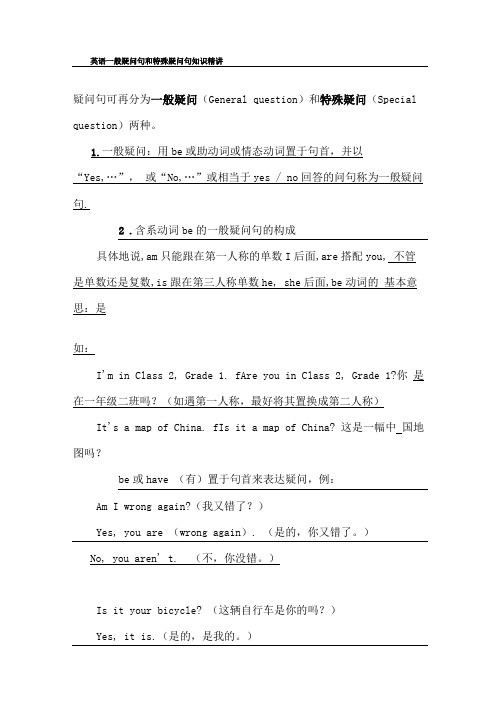
英语一般疑问句和特殊疑问句知识精讲疑问句可再分为一般疑问(General question)和特殊疑问(Special question)两种。
1.一般疑问:用be或助动词或情态动词置于句首,并以“Yes,…”,或“No,…”或相当于yes / no回答的问句称为一般疑问句.2.含系动词be的一般疑问句的构成具体地说,am只能跟在第一人称的单数I后面,are搭配you, 不管是单数还是复数,is跟在第三人称单数he, she后面,be动词的基本意思:是如:I'm in Class 2, Grade 1. fAre you in Class 2, Grade 1?你是在一年级二班吗?(如遇第一人称,最好将其置换成第二人称)It's a map of China. fIs it a map of China? 这是一幅中国地图吗?be或have (有)置于句首来表达疑问,例:Am I wrong again?(我又错了?)Yes, you are (wrong again). (是的,你又错了。
)No, you aren' t. (不,你没错。
)Is it your bicycle? (这辆自行车是你的吗?)Yes, it is.(是的,是我的。
)No, it isn' t.(不,那不是我的。
)Were there many people at her birthday party?(她的生日宴会来了很多人吗?)Yes, there were. (是的,来了很多人。
)No, there weren’ t. (没有,没有很多人。
)Have you money with you? (你身上带钱了吗?)(=Do you have money with you?—美语)Yes, I have.(Yes, I do.—美语)(有,我带钱了。
)No, I have no money with me. (No, I dori* t.—美语)(没有,我没带钱。
特殊疑问句和一般疑问句的用法

特殊疑问句和一般疑问句的用法集团文件发布号:(9816-UATWW-MWUB-WUNN-INNUL-DQQTY-(一)?? 由be(am,is,are)引导的一般疑问句1、Am I a student? 我是学生吗 Yes,you are./ No,you aren’t.2、Is this /that/it a chair?这/那/它/是一把椅子吗 Yes,it is. /No,it isn’t.3、Is she/Amy your sister?她/艾米是你的妹妹吗Yes,she is ./ No,she isn’t.4、Is he/Mike your brother?他/迈克是你的哥哥吗Yes,he is./No,he isn’t.5、Is your brother helpful at home? 你哥哥在家有用吗Yes, he is./ No, he isn’t.6、Is there a forest in the park? 在公园有一个森林吗Yes,there is./No,there isn’t. 是的,有。
/不,没有。
7、Are there any panda s in the mountains?在山上有熊猫吗Yes,there are./No,there aren’t.是的,有。
/不,没有。
8、Are they dusk s? 它们是鸭子吗(问物)Yes, they are. /No,they aren’t.是的,它们是。
/不,它们不是。
9、Are they famers? 他们是农民吗(问人)Yes, they are. /No,they aren’t. 是的,他们是。
/不,他们不是。
10、Are you a teacher?你是一个老师吗(问you 用I回答)Yes, I am./No,I’m not.是的,我是。
/不,我不是。
11、Are you teacher s?你们是老师吗</P< p>Yes,we are./No,we aren’t.是的,我们是。
一般疑问句和特殊疑问句的基本用法汇总

一般疑问句1、一般疑问句的结构:一般疑问句有两个家族。
第一家族为含be动词或情态动词的一般疑问句,其结构为:●be + 主语+ 其它部分?●情态动词+ 主语+ 动词原形 + 其它部分?肯定回答用"Yes,主语+be/情态动词.",否定回答用"No,主语+be/情态动词+not."。
be 或情态动词和not可用缩写形式,主要有isn't,aren't,wasn't,weren't,can't,mustn't,needn't等。
Eg1. 问句: Is this your English book?肯答: Yes,it is. 否答: No,it isn`t.Eg2. 问句: Are these your English books?肯答: Yes,they are. 否答: No,they aren't.Eg3. 问句: Can you speak English?肯答: Yes,I can. 否答: No,I can't.注意:例句1和例句2,在回答时必须将this/that与these/those分别变为it和they。
另一家族为含行为动词(或称为实义动词)的一般疑问句,其结构为:助动词+ 主语+ 动词原形 + 其它?肯定回答用"Yes, 主语+ do/does.",否定回答用"No, 主语+do/does not."。
助动词也常用缩写形式,主要有don't,doesn't,didn't等。
Eg4. 问句: Do your parents like English?肯答: Yes,they do. 否答: No,they don't.2、一般疑问句的回答正如前面所述,回答一般疑问句时有肯定回答和否定回答两种方式,肯定回答以Yes起句,否定回答用No开头。
初一一般疑问句及特殊疑问 句

一般疑问句及特殊疑问句一、一般疑问句的基本用法及结构一般疑问句的基本用法:用于对某一情况提出疑问,通常可用yes 和no来回答,读时用升调。
其基本结构是“be / have (情态动词)/ 助动词+主语+谓语(表语)”:Is she interested in singing? 她有兴趣唱歌吗?Have you ever been to Japan? 你到过日本吗?Can you swim? 你会游泳吗?Does she often go shopping? 她经常去购物吗?Did you go to the park yesterday? 你昨天有没有去公园吗?二、陈述句变一般疑问句的方法首先,我们要把动词分类,在初中阶段,动词有以下三类:每一类:be动词,第二类:情态动词,如have ,can ,may ,should ,must,could,might,shall.第三类:行为动词,也就是实意动词。
最后要注意的是一些词,如第一人称要改为第二人称,I—you ,we—you,my—your,some—any,1. 动词be的疑问式:动词be根据不同的时态和人称可以有am, is,are, was, were等不同形式,含有be动词的陈述句构成疑问式时,一律将动词be的适当形式置于句首:(1)I am twelve.Are you twelve? 你是12岁吗?(2)You are feeling better today?Are you feeling better today? 你今天感到好些了吗?(3)He is a good student.Is he a good student? 他是个好学生吗?(4)There are some desks here .Are there any desks her? 这有一些桌子吗?(5)He was late for school.Was he late for school? 他上学迟到了吗?2.情态动词:如can ,may ,should ,must, could,might,shall.(1)You can speak English.Can you speak English? 你会说英语吗?(2)I must finish the work at once.Must I finish the work at once? 我必须马上完成工作吗?(3)He should stay at home?Should he stay at home? 他必须呆在家吗?(5)She may be at home.May she be at home? 她可能在家吗?(6)He used to get up late.Used he to get up late? 他通常起床很迟吗?3.实意动词的疑问式:含有一般实意动词的陈述句,通常应根据不同时态和人称在句首加助动词do, does, did等.一般现在时用do ,does, (第一人称,第二人称,所有的复数人称用do,第三人称单数用does),一般过去时用did.(1)I go to school from Monday to Friday.Do you go to school from Monday to Friday? 你周一到周五都上学吗?(2)They come to school by bus.Do they come to school by bus ? 他们是坐公车上学吗?(3)The boy likes dancing.Does the boy like dancing? 这男孩喜欢唱歌吗?(4)Jim and Tom have dinner at 7o’clock.Do Jim and Tom have dinner at 7o’clock? 吉姆和汤姆是7点吃晚餐吗?(5)She saw the film last night.Did she see the film last night? 她昨晚看了这部电影吗?(6)They did their homework just now.Did they do their homework just now? 他们刚刚做了家庭作业吗?陈述句变一般疑问句练习根据句后括号内的要求,填入句中所缺的词: 1.I know the answer.(一般疑问句) ______ ______ know the answer? 2.We can see some birds.(一般疑问句) ______ ______ see ______ birds? 3.There is a computer in my house.(一般疑问句) ______ ______ a computer in house? 4.There are some flowers on the teachers’desk.(一般疑问句) ______ ______ ______ flowers on the teachers’desk? 5.There are some apples on the tree.(否定式) There ______ ______ ______ apples on the tree. 6.I think he is very old.(否定句) I ______ think he ______ very old. 7.Please colour it green.(否定句) ______ ______ colour it green. 8.We can speak good English.(变否定句) We ______ ______ speak good English. 9.Thank you for helping me.(同义句) Thank you for ______ ______ . 10.There aren’t any pears in thebox.(同义句) There are ______ pears in the box. 11.Whose are these clothes?(同义句) ______ ______ are these? 12.Let me look at your book.(同义句) Let me ______ ______ ______ ______ your book. 13.Her sweater is red.(对划线部分提问) ______ ______ is her sweater? 14.My pencils are in the pencil-box.(对划线部分提问) ______ ______ your pencils? 15.I get up at six every day.(对划线部分提问) ______ ______ do you get up every day?16.There are fifty students in my class.(对划线部分提问)______ ______ students are there in your class?17.These are cars.(用buses改写成选择疑问句) Are these cars______ ______ ?18.The book is in my schoolbag.(变否定疑问句) ______ the book in your school-bag?19.Two boys are in our house.(改为there be句型) ______ ______ two boys in our house.20.Can’t you find the map?(作肯定回答) ______ ,I______ .陈述句变一般疑问句:1. His father is an English teacher.2. These cats are crying.3. They can swim.4. I like to read English.5. I go to school on foot.6. He likes English.7. His father goes to work by bus.8. He is crying under the tree.9. His birthday is on the twentieth of November.10. Mrs. Li and Kitty are in a big shop.11. Kitty is wearing her new uniform.12. The boy under the tree is hungry.13. He goes to school every day.15. I want to have a model car.16. She wants a cup of coffee.17. Mrs. Li and Kitty watch television at night.18. I do my homework after school.陈述句变一般疑问句练习21. Everybody is in the classroom.2. The boy does some housework at home.3. The children had a good time in the park.4. Jim has some story-books.5. Mr. Hunt told us something important at the meeting.6. The old man does morning exercises every morning.7. We are from China.8. I must finish my homework before eight o’clock.9. He often goes to the library on Sundays.10. They have a class meeting every week.特殊疑问句1、填入所缺的疑问词1. _______do you like summer? Because I can swim.2. is the post office? It’s next tothe cinema.3. can I get to Zhong Shan Park? By underground.4.______ _______ are you? I’m 14years old5. bag is on the desk?.Xiao Zhang’s.6. book is Sarah’s? The yellow one.7. ______ will go with you? ChenJie. 8. _______is your skirt,Amy? It’s 100 yuan.2、选词填空1. (What date,What day) is it today? It’s Monday.2. (What date, what day) is today? It’s May 27th.3. (How far , How long ) is your school? It's ten minutes' walk.4. (How many , How much )orange juice can you buy? A little.5. (Which , What ) fruit do you like? Apples.6. (Who , Whose ) is that boy? He is Mike.7. (Which , where) floor do you live? The fifth floor.8. (How often , How long) do you go swimming ? Three times a week.9. .____________ (How often, How soon ) will you get to the forest? In one week.10. .____________(How far, How fast) can he swim in one minute? 600 metres.3、4、 .对划线部分提问1. They bought a new bike yesterday.2. She is a nurse ._______________________________________________________________3.The girl in red is my cousin.4.He read the book for three hours.________________________________________________________________5. She made a living by selling newspapers.6. Julia often talks withme after class.________________________________________________________________7.There were 50 students in our class last term. 8.They come from Hubei .__________________________________________________________________9.Tim went to school late because he got up late. 10.It is windy ._______________________________________________________________________11. Li Hui goes to school by light rail. 12. I wash it twice a week . _____________________________________________________________________13. Let's meet at 7:30 tomorrow morning. 14.The movie waswonderful.___________________________________________________________________15. The book cost me nine dollars. . 16 He will be back in four days .____________________________________________________________________17. Two plus four is six. 18. He often has lunch in thefactory._______________________________________________________________________19. He is feeling well. 20. Dick hurt his leg last Sunday. _______________________________________________________________________5、6、选择题1. ( ) Excuse me ______ is the nearest bookshop? Go down thestreet and turn left .A. howB. whatC. whereD. who2. ( ) ______ is a ticker for the film Hacker He? About forty yuan .A. How oldB. How manyC. How muchD. How often3. ( )—________ are you going? — I’m going to the library.A. WhoB. WhichC. WhatD. Where4. ( ) _______________? ----It’s eight.A. What day is itB. What’s five and threeC. How old are youD. What’s your telephone number5. ( ) —____________? —I’ve got a headache and a cough.A. What’s the matter with youB. What’s wrong with itC. Can I help youD. How are you6. ( ) .-______ tea did you have? ----Two cups.A. How manyB. How muchC. How soonD. Which7. ( ) --______ a year does your school have sports meetings? ---Twice a year.A. How oftenB. How soonC. How longD. How many times8. ( )-- ______? -----The one behind the tree.A. Whose girlB. Who’s that girlC. Which girlD. Where’s the girl9. ( ) -______ are you going to be in the future? I want to be a person_____ Yang Liwei.A. How , likeB. How , asC. What , likeD. What , as10. ( ).______ will your father be back? .A How longB how oftenC How soonD How wide7、按要求改写句子(对划线部分提问)1. They meet each other once a month.________ ________ ________ they meet each other?2. Tony went swimming last Thursday.________ ________ Tony _______ swimming?3. My cousin looks like a sportsman. ________ ________ yourcousin look?4. The short play was wonderful.________ did you ______ the short play?________ did you _______ ______ the short play?5. Our party lasted three hours. _______ _______ did your partylast?6. I watched the variety show on TV. ________ ________ did youwatch on TV?7. It's Tuesday. ________ ________ is it today?8. The supermarket is about five minutes' walk. ________ ________ isthe supermarket?9. They went to the park by bus. ________ ________ they go tothe park?10. Bob surfed the Internet for forty minutes yesterday morning._______ _______ ________ Bob surf the Internet yesterday morning?。
- 1、下载文档前请自行甄别文档内容的完整性,平台不提供额外的编辑、内容补充、找答案等附加服务。
- 2、"仅部分预览"的文档,不可在线预览部分如存在完整性等问题,可反馈申请退款(可完整预览的文档不适用该条件!)。
- 3、如文档侵犯您的权益,请联系客服反馈,我们会尽快为您处理(人工客服工作时间:9:00-18:30)。
(一)由be(am,is,are)引导的一般疑问句1、Am I a student? 我是学生吗? Yes,you are./ No,you aren’t.2、Is this /that/it a chair?这/那/它/是一把椅子吗? Yes,it is. /No,it isn’t.3、Is she/Amy your sister?她/艾米是你的妹妹吗?Yes,she is ./ No,she isn’t.4、Is he/Mike your brother?他/迈克是你的哥哥吗?Yes,he is./No,he isn’t.5、Is your brother helpful at home? 你哥哥在家有用吗?Yes, he is./ No, he isn’t.6、Is there a forest in the park? 在公园有一个森林吗?Yes,there is./No,there isn’t. 是的,有。
/不,没有。
7、Are there any panda s in the mountains?在山上有熊猫吗?Yes,there are./No,there aren’t.是的,有。
/不,没有。
8、Are they dusk s? 它们是鸭子吗?(问物)Yes, they are. /No,they aren’t.是的,它们是。
/不,它们不是。
9、Are they famers? 他们是农民吗?(问人)Yes, they are. /No,they aren’t. 是的,他们是。
/不,他们不是。
10、Are you a teacher?你是一个老师吗?(问you 用I回答)Yes, I am./No,I’m not.是的,我是。
/不,我不是。
11、Are you teacher s?你们是老师吗?</P< p>Yes,we are./No,we aren’t.是的,我们是。
/不,我们不是。
(二)、由do引导的一般疑问句1、Do you like apple s?你喜欢苹果吗? Yes,I do./No,I don’t. 喜欢。
/不喜欢。
2、Do you often play football,Mike and John? 迈克和约翰你们经常踢足球吗?Yes,we do. /No,we don’t.是的。
/不是。
3、Do they like apples?他们喜欢苹果吗?Yes,they do./No,they don’t. 喜欢。
/不喜欢。
(三)由does引导的一般疑问句1、Does your sister like apples? 你姐姐喜欢苹果吗?Yes, she does./ No, she doesn’t.2、Does your brother like apples? 你哥哥喜欢苹果吗?Yes, he does./ No, he doesn’t.(四)由can引导的一般疑问句1、Can I wear my new shirt today?我今天可以穿我的新衬衫吗?Yes,you can./No,you can’t. 可以,你可以。
/不,你不可以。
2 、Can you set the table?你会摆饭桌吗? Yes,I can./No,I can’t.3. Can Tom set the table? 汤母会摆饭桌吗?Yes, he can./No, he can’t.4 . Can Sarah set the table? 萨拉会摆饭桌吗?Yes,she can./No, she can’t.5、Can Mike and John (they) sweep the floor? 迈克和约翰/他们会扫地吗?Yes,they can./No, they can’t.会,他们会。
/不,他们不会。
6 、Can I help you?=What can I do for you?我能帮助你吗?Yes,please.I want two pears.二、特殊疑问句(一)、由what(什么)引导的特殊疑问句1、What’s this/that/it ?这/那/它是什么?It’s a desk.它是一张椅子。
2 、What are they/these/those? 它们是/这些/那些是什么?</P< p>They are apples.(问物时根据实际情况回答)3、What do you do?=What are you? (what后面加人便问职业) 你是干什么工作的?I am a teacher.我是老师。
4、What does your father do?=What is your father? 你爸爸是干什么工作的?He is a doctor.他是医生。
5、What do they do?=What are they? 他们是干什么工作的? They are nurse s.6、What can you do? 你会做什么? I can cook the meals.我会做饭。
7、What can your father/brother do? 你的爸爸/哥哥会做什么?He can sweep the floor.他会扫地。
8、What can your mother /sister do? 你的妈妈/姐姐会做什么?She can cook the meals. 她会做饭。
9、What do you like? 你喜欢什么?I like pears.我喜欢雪梨。
10、What would you like for breakfast?早餐你想吃什么?I’d like some milk and bread.我想吃牛奶和面包。
11、What would you like for lunch?午餐你想吃什么?I’d like fish and green beans. 我想吃鱼和青豆。
12、What would you like for dinner (supper)?晚餐你想吃什么?I’d like fish and tofu. 我想吃鱼和豆腐。
13 、What’s the weather like in Beijing?北京天气怎么样? It’s warm and windy.14、What’s your favourite food? 你最喜欢的食物是什么? I like + 任何食物。
15、What’s your favourite meat? 你最喜欢的肉是什么? I like +肉类。
16、What’s your favourite fruit? 你最喜欢的水果是什么?I like + 水果。
17、What’s your favourite drink? 你最喜欢的饮料是什么?I like +饮料。
18、What’s your favourite class? 你最喜爱的课程是什么?My favourite class is+ 课程/ I like +课程19、What is your favourite animal? 你最喜欢的动物是什么?I like +动物20、What’s your favourite sport? 你最喜欢的体育是什么?I like swimming.21、What do you have on Mondays? 星期一你上什么课?I have English,math and art.22、What is your mother like?你的妈妈长得怎么样?She is tall and young.23、What’s your father like? 你的爸爸长得怎么样?He is tall and strong.24、What is your room like? 你的房间怎么样?It’s big and nice.25、What do you do on the weekend? 周末你通常做什么?I often play football.(二)由what colour(什么颜色)引导的特殊疑问句1.What colour is the dog? 这只狗是什么颜色?The dog/It is yellow.2.What colour is it? 它是什么颜色?It is green.它是绿色。
3.What colour is your shirt?(单数)你的衬衫是什么颜色?My shirt/It is white.4.What colour are your jeans?(复数)你的牛仔裤是什么颜色?My jeans/They are blue.(三)由what time(几点)引导的特殊疑问句1、What time is it?=What’s the time?现在几点钟?It’s seven o’clock./It’s 8:50.(四)由what day(星期几)引导的特殊疑问句1、What day is it today?今天星期几?It is Monday. 今天是星期一。
2. What day is it tomorrow?(明天星期几?)It is Tuesday. 明天是星期二。
(五)由where(哪里)引导的特殊疑问句1、Where is the closet ?衣橱在哪里?(问单数)It’s near the bed.2、Where are the picture s?这些图画在哪里?(问复数)They’re on the wall.3、Where are you from ?你来自哪里? I’m from China.4、Where are they from? 他们来自哪里?They’re from Canada.Where is he/she from? 他/她来自哪里?He/She is from America.注意:Where 问地点,一般回答有地点介词in,on, under, behind, in front of, near, from, over等。
(六)由why(为什么)引导的特殊疑问句1、Why do you like apples?你为什么喜欢苹果?Because they’re healthy.因为它们很健康。
(七)由who(谁)引导的特殊疑问句1、Who is that man?那个男人是谁? He is my father.他是我的爸爸。
2、Who’s that boy? 那个男孩是谁? He 's my brother. 他是我的哥哥。
3、Who is that woman? 那个女人是谁? She is my mom.她是我的妈妈。
